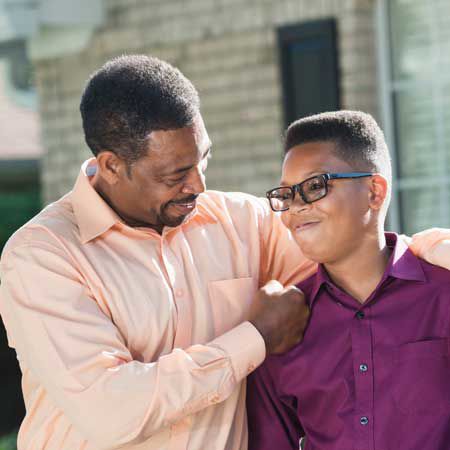5 Tips to Build Resilience in School-Aged Children
(Family Features) Resilience – the capacity to prepare for, adapt to and grow through disruption, trauma and loss – is a skill many parents want for their children. However, there is more to it than “pulling yourself up by your bootstraps” or persevering through hardships.
According to a Pew Research Center survey, approximately 70% of teens between the ages 13-17 cited anxiety and depressions as a major problem among peers, while 55% said bullying was a major problem. Among the pressures facing teens, getting good grades topped the list at 61%.
Mollie Marti, PhD, founder of the National Resilience Institute, delivers workshops and trainings around the world to help organizations and communities cultivate resilience – a need, she says, that pre-dates COVID-19, especially among young people.
Recognizing the importance of resiliency in youth, Connections Academy, an online public school program for grades K-12, has partnered with the National Resilience Institute to elevate the topic of resilience and share expert advice for raising children who are brave, curious and better able to adapt to life’s ups and downs.
“Even before the pandemic, the statistics about anxiety and depression among teens were cause for great concern,” said Marti, who also compiled a guest blog series on resilience-building for Connections Academy. “More than ever, it’s important for parents and schools to actively foster the growth of children who can problem-solve and adapt when facing challenging situations.”
Teach Self-Care
To ensure your kids can joyfully and effectively contribute to those around them – socially, physically, emotionally and mentally – it’s important to teach them self-care skills. Modeling behaviors such as eating healthy, getting proper sleep, exercising, investing in meaningful relationships and activities, and finding time to reflect, rest and repair can lead to your kids mimicking these acts. Ensuring your children are finding time to care for themselves can help them lead more balanced lives.
Create Self-Awareness
Children often learn the most about themselves when faced with adversity. Helping your children understand what motivates, scares or frustrates them and what they need to feel valued or loved can help build self-awareness. Understanding those feelings can help them better respond to stressful or negative situations and minimize conflict while also communicating their needs and expectations.
 Build Relationships and Resources
Build Relationships and Resources
Human resilience is often best cultivated in a community with others, and encouraging your children to actively seek out meaningful relationships can help them build a social support system. For example, because of the online school model at Connections Academy, teachers can spend more one-on-one time with students building strong relationships and ensuring they are thriving both emotionally and academically via phone calls, interactive video lessons, email and in-person events.
“We see many students come to Connections Academy because they faced social or emotional challenges at their former school,” said Melissa Brown, Connections Academy director of schools. “I hear from our teachers all the time that they know their students better in the virtual classroom than they ever did in the traditional classroom.”
Heather Franz was one of those parents who decided to transition her son to virtual school after he suffered through years of bullying at his brick-and-mortar school. The switch to a safe learning environment at home and the individual support provided by the teachers helped Franz’s son thrive.
Practice Regulating Emotions
In times of fear, stress or frustration, it becomes more difficult to regulate emotions and take a logical approach to the situation at-hand. To prepare your children to deal with these situations, have them practice breathing exercises when they feel anger or stress setting in, and encourage stress-reducing physical activities such as yoga, meditation or working out.
Promote Self-Advocacy
Teaching your children strategies to mitigate conflict and to be advocates for their needs and wants can go a long way when facing difficult situations. However, it’s also important to make sure they’re not afraid to seek out help from a parent, teacher or other trusted adult. Encourage them to use direct language and phrases like “I don’t like it when you do that, please stop” when necessary and to recognize stressors – like bullies or social anxiety – and toxic environments. For example, Franz knew it was time to intervene and make a change in her son’s academic environment when he finally told her he needed to talk to someone about his situation. By getting her son treatment for his anxiety and switching schools, she was able to start him on a path toward wellness.
As all children will encounter various levels of adversity during their lives, helping them build resources and relationships can ensure they’re prepared to deal with the experiences that await. Visit ConnectionsAcademy.com to learn more and find a variety of tips and insights for parents about remote learning and building resilience, among many other topics.
Creating a Safe Zone for Students
When Heather Franz noticed her son was starting to shut down, become withdrawn and his grades were slipping, she became concerned. Another parent brought it to her attention that there might be bullying involved and, upon digging deeper, she realized it was to the point of him “being afraid to say anything in class without being torn apart.”
After beginning to have panic attacks at school, Franz’s son was diagnosed by a specialist with anxiety, trauma and post-traumatic stress disorder in the sixth grade. While continuing to get professional help, Franz also opted to put him in a virtual school as crowds in the brick-and-mortar school environment exacerbated his anxiety, and he sought more individualized challenges.
Franz noticed a change almost immediately in her “previously shutdown” son after he started his seventh-grade school year at Connections Academy, which created “a safe zone for her son.” Now in eighth grade, his mood has improved and he’s an honor roll student who frequently wants to take part in activities and have friends over to visit. He’s also working to help other kids with similar challenges, even integrating creative ideas, like putting calming rooms in public schools and other public places, into his school projects.
Photos courtesy of Getty Images

